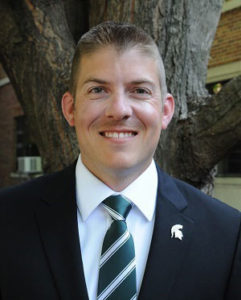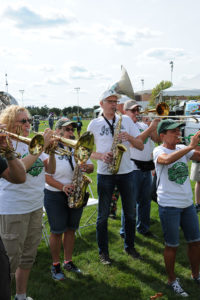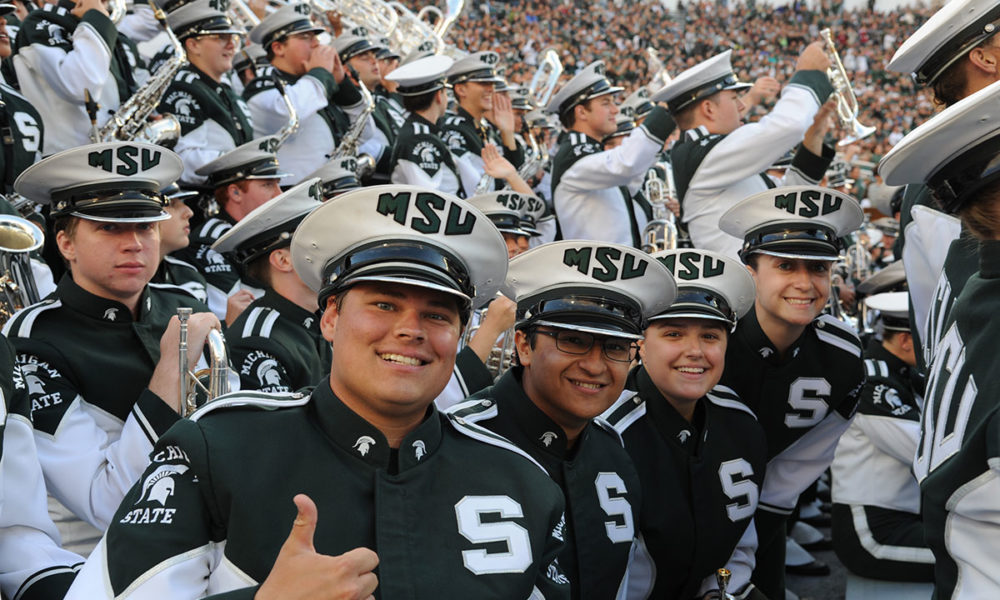The band program at Michigan State University experienced extreme celebrations and extreme disappointments during its 150th season but already looks toward 2021 for new opportunities and the release of its commemorative CD.
 The 2019 to 2020 school year marked the 150th anniversary of the Michigan State University (MSU) band program. To celebrate, members of the Spartan Marching Band teamed up with alumni for a combined halftime performance at the fall 2019 Homecoming game. In the spring of 2020, concert band ensembles planned to play new pieces to commemorate the anniversary until the COVID-19 pandemic caused MSU—and practically all schools—to go completely virtual.
The 2019 to 2020 school year marked the 150th anniversary of the Michigan State University (MSU) band program. To celebrate, members of the Spartan Marching Band teamed up with alumni for a combined halftime performance at the fall 2019 Homecoming game. In the spring of 2020, concert band ensembles planned to play new pieces to commemorate the anniversary until the COVID-19 pandemic caused MSU—and practically all schools—to go completely virtual.
Following the postponed celebration came a canceled 2020 marching band season. According to David Thornton, associate director of bands and director of the Spartan Marching Band, MSU is focused on the future and says that the Spartans’ family-like culture has helped the band move through this uncertain time together.
Halftime: Congratulations on your 150th anniversary! What celebrations did you hold?
Thornton: In the 2019-2020 school year, we had an alumni band reunion. … I was responsible for coordinating what was the largest Alumni Band Day that we’d ever had. We had 900 people come to participate. … We had several former directors come back. We had folks that were in the band in the 40s and 50s come back and participate. That was really special.
Last April [2020], we were supposed to have [an] indoor concert with each one of our concert ensembles. That was postponed. We scheduled it for this past fall, but we weren’t doing anything in person on campus, so we haven’t celebrated that part yet. These pieces that have been written for each one of our concert ensembles haven’t been played; that’s been a little frustrating, but we will have a celebration at some point.
Halftime: How has the band program adapted to COVID restrictions?
Thornton: MSU has been fairly reserved about allowing on-campus activities and classes in person. We’re doing a little bit more this semester, which is a step up from doing nothing in person last semester.
Last fall, the whole university was virtual. … This semester, we have three in-person bands, and we have a virtual ensemble. … The largest group that’s going to be [physically] together is 15 or 16 people.
Halftime: Since Big Ten bands didn’t perform at football games during the 2020 season, what activities did the Spartan Marching Band do during that time?
Thornton: We met [virtually] twice a month on our usual Monday evenings. We did some history nights where we talked about the band. We did some marching fundamental review. The students and the leadership teams organized various social events to create community. …
Playing [music] over the internet doesn’t really work; we didn’t try to force a square peg into a round hole. …
Those bimonthly events didn’t have 100% attendance. … We probably had about one-third of the band participate regularly, so about 100 students.
Now, we’re focused toward 2021. We’ve elected our next leadership team. We’re going to try to transition from “I miss the 2020 season” and think more optimistically toward the 2021 season.
 Halftime: The Spartan band created a seven-page history section on the website at spartanband.net/history and has created a new highlights CD; what are your plans for releasing the album?
Halftime: The Spartan band created a seven-page history section on the website at spartanband.net/history and has created a new highlights CD; what are your plans for releasing the album?
Thornton: We have the CDs; they look great. They’re highlights from two years ago. Some of the songs that we played at the 150th reunion are on there. … At some point, it’s supposed to be on Apple Music and Spotify. We recorded all of those things in the 2019 year. … It takes the spring to produce and edit. The CDs got here around October. We were a little delayed, given all the setbacks. They’re sitting here in my office, and they’re ready to be out in the world hopefully next fall. We sell them here locally and at tailgates.
Halftime: You became marching band director in 2017. When you transitioned into that new role, what changes did you make, and what traditions did you uphold?
Thornton: This is my fourth year as the director. I’ve actually been at MSU and involved in the program for nine years total. I came here in 2012 to do some graduate work. I ended up staying and getting both my Master’s and my Doctorate [degrees] here. I was in the assistant director role for a couple years. When I came here, I was overwhelmed with the ability level of the band.
I will say that the transition was challenging, taking over for someone who had been here for so long. I was the young new guy. … When I look back on it now, I’m really proud of the work we’ve done in four years.
Halftime: What advice would you offer other band directors taking over a program with such a long and rich history?
Thornton: You’ve got to take everything one step at a time. Trust isn’t built overnight. You’ve got to be consistent about what you believe. Making wholesale changes in your first year at any new job is probably not smart. I have a lot of respect for the system we have in place here.
A mentor of mine many years ago told me, “Only change what you can’t live with in your first year.”
Maybe you tackle those things [first], and over time, you start to shape the vision and culture.
Halftime: Culture is clearly important to the Spartan Marching Band. How would you describe the band’s core values?
Thornton: If you were to talk to my students and ask them one word to describe the marching band, I’d bet most of them would say the word, “family.” A lot of our students find a home in our marching band.
I take a lot of pride in the way we treat each other and the amount of respect we have for each other. It’s really cool to be the second oldest band in the Big Ten. … We talk about our history. … The students take a lot of pride in that.
I’m not sure the 19-year-old version of myself would’ve taken as much time to absorb some of that.


